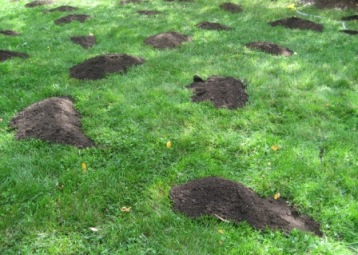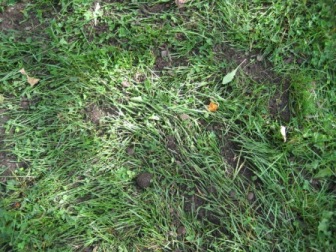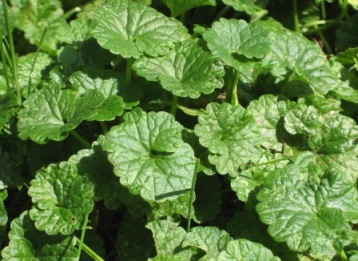Well, part of my lawn. It turns out I didn’t order enough compost.
Here it is scattered in its little piles.

Next step: I had to rake it all to spread it — or more precisely, knock it off the leaves of the grass so it won’t kill it, which would have rather defeated the purpose.

About halfway through doing this I realized that I am, as an Englishman might put it, “barking mad.”
Composting a lawn?
There is a reason that uniform, green-all-year-round lawns and eco-awareness don’t mix. They aren’t supposed to.
And since my front lawn is that compost-awkward size — too small for two yards of compost, two big for one — and since I decided during a rare burst of fiscal prudence to err on the side of too little compost when I ordered it on Saturday — I have now a 1/2 composted lawn.
I’m toying with what would be wiser. Leave the other half uncomposted as a test to see if the effort is really worth it?
Or shell out for another load to spread next weekend . . .
We’ll see.
In the meantime, one of the things compost won’t really help of course is weed control (yeah I know, theoretically if your grass is happy it will compete better — but compost nourishes weeds too now, doesn’t it). As I’ve mentioned in another post, I’ve been applying corn gluten in the spring; it inhibits seed germination and so over time will cut down on weeds. Some weeds — if they’re annuals or short-lived perennials. Any perennial that lives on like grass, otoh, will be unaffected by corn gluten — and speaking of the English, one of the weeds I have the most problem with, Glechoma hederacea, is a non-native plant brought over here by someone on that side of the pond.

I suspect the English. Wikipedia mentions an English herbalist, John Gerard, who said a brew of it cures tinnitus, and that
Glechoma was also widely used by the Saxons in brewing beer as flavoring, clarification, and preservative, before the introduction of hops for these purposes; thus the brewing-related names, Alehoof, Tunhoof, and Gill-over-the-ground.
Some descriptions say it smells minty but that’s only one aspect of its odor. Excuse me, “odour.” Its smell is unlike anything else — strong, bitter, medicine-y.
It’s happy in sun and shade, doesn’t mind being cut low, is happy to grow right over top your grass if you cut it high. It loves to take over the edges of things — the edge of a garden, the edge of the driveway, the edge of a new patch of lawn you’ve reseeded for some reason.
The good news. Wikipedia and this article both say you can get rid of it by using Borax, which is relatively non-toxic.
I may give that a try . . .
On the other hand, I have tinnitus . . . hmmm . . .
